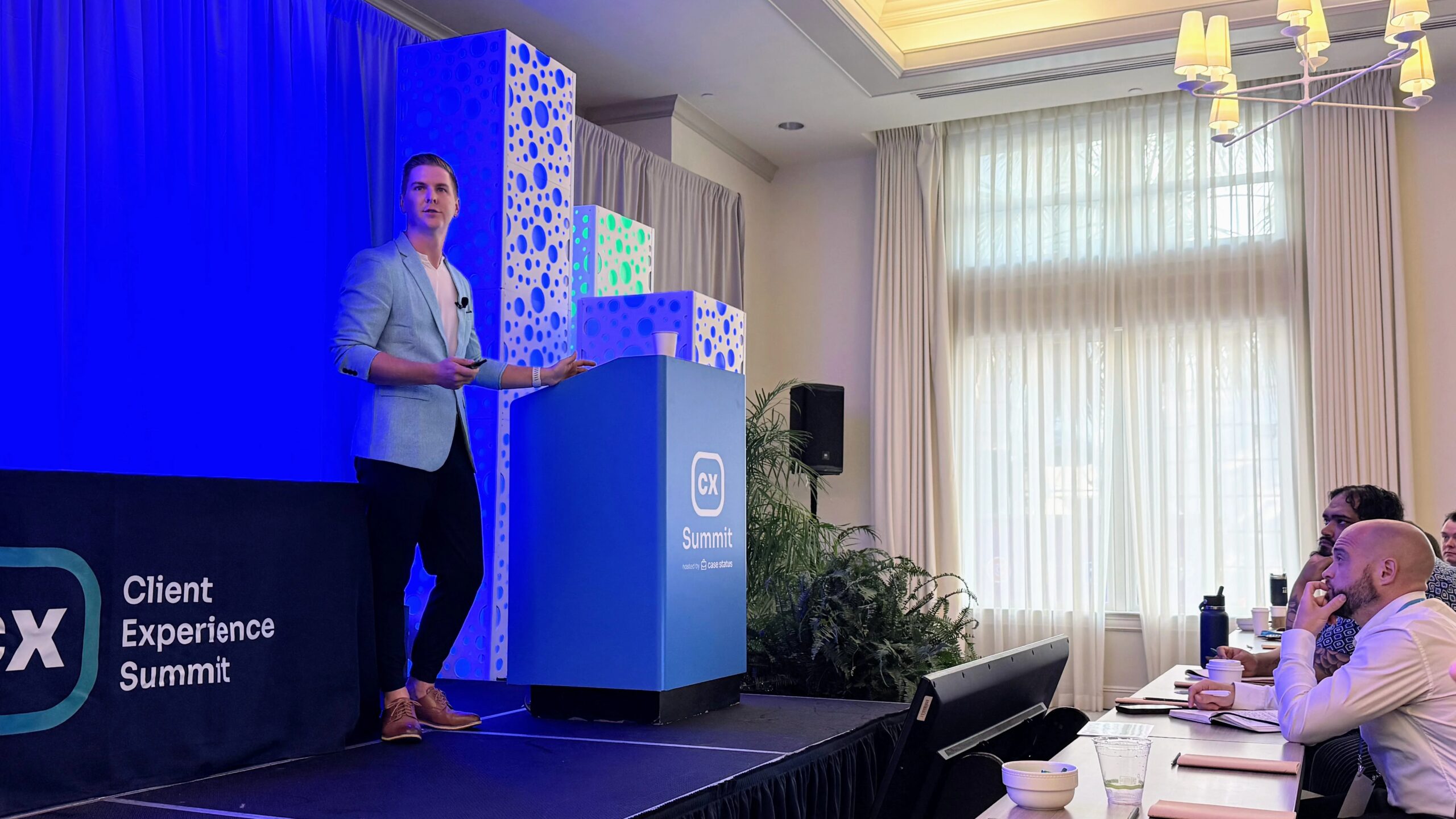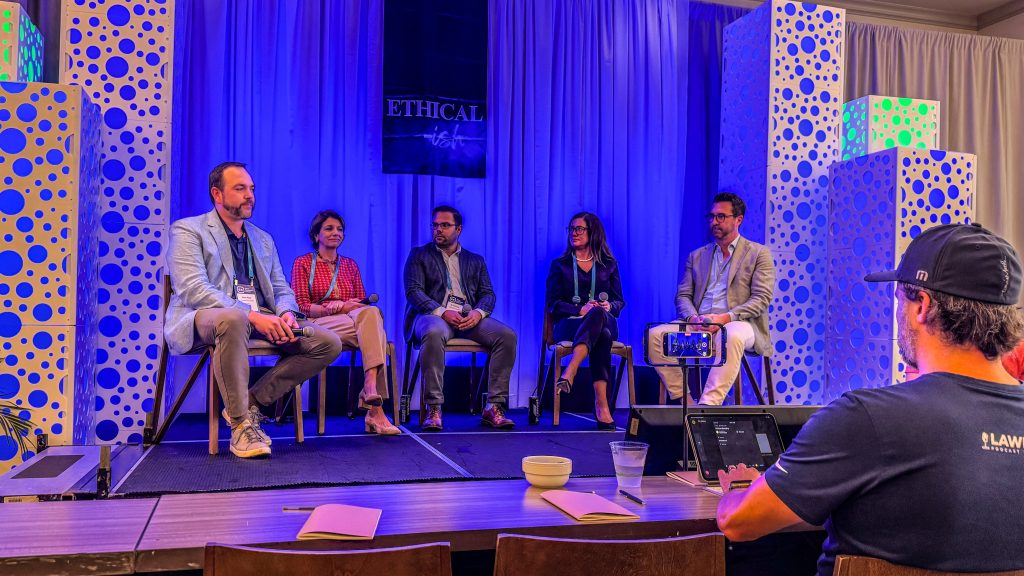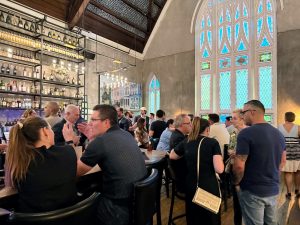In Praise of Small Legal Tech Conferences: Lessons from Case Status’ Customer Experience Summit

For the second time in a month, I attended a first conference. And once again, the inaugural conference exceeded my expectations.
Several weeks ago I wrote about Kaleidoscope, the first talk produced at 8 a.m. This time I found myself at Customer Experience Summitthe legal technology company’s inaugural conference File statuswhich was held in his hometown of Charleston, South Carolina, September 24-26.
As the legal tech conference landscape becomes increasingly crowded – this month alone there are multiple conferences each week – a counterintuitive trend is emerging: smaller, client-focused conferences also generate value, but in a more targeted way.
The power of concentration
The two-day summit focused on a single critical question: How can law firms improve their clients’ experiences? As co-founder and CEO Andy Seavers (pictured above) said in his opening speech: “Without the customer, there is no case. Without the customer, there is no business. This is a customer business and we must put the focus on the customer.”
It wasn’t a sprawling event trying to please everyone. Instead, it brought together practitioners from small and medium-sized firms – primarily focused on personal injury, immigration, family and employment law, and all united in their interest in better serving their clients.
Employment lawyer Christy Granieri said her “technology-driven” firm won’t accept clients who don’t want to use the Case Status app.
This focused approach created something not always found at large legal technology conferences: peer-to-peer learning and sharing opportunities. When one speaker, an executive at a California employment agency, described her practice as “a case status business” — going so far as to say she wouldn’t take clients reluctant to use the app — you could almost feel it resonate with others in the room.
What made it work
Like the Kaleidoscope conference, this first summit was refined and professional. Among the elements that made it this way:
- Practical knowledge of practitioners. The speaker lineup included attorneys and firm executives who are actively involved in running their own firms. This meant the programs offered proven information from people who do this stuff every day. The sessions covered customer experience, customer service, technology integration and sustainable business growth, all grounded in real-world experience.
- Two complementary tracks. The summit proposed two complementary avenues. The Future-Focused track examined client experience as a long-term growth driver and strategic differentiator, while the Tech-Forward track explored how data, AI, automation and integrated legal technology can modernize client interactions.
- The Charleston Advantage. Let’s be real: location is important for a conference. The summit took place at the Emeline Hotel, a beautifully renovated historic hotel in the heart of downtown Charleston, a beautiful and historic city. With almost all programs and meals held on-site, attendees were just steps away from the summit’s learning and networking opportunities.
- Universal CLE credit. In a detail that matters to practicing attorneys, each program offered CLE credits for each state. These details transformed the conference from simply enjoyable to attend to a wise investment in professional development.
The advantage of the customer conference
The CX Summit reflects a growing trend among legal technology companies, including smaller ones, to host their own customer conferences. While this makes the legal tech conference calendar increasingly crowded, the proliferation of events is actually positive for the legal community.
Rather than forcing everyone into one-size-fits-all mega-conferences, this growing range of smaller conferences offers events tailored to specific interests, practice areas, and technology ecosystems.

A live recording of the Ethical-ish podcast focused on AI ethics, with Brian Page, legal director of Trust Guss Injury Attorneys; Constance Anastopoulo, president of Charleston Law School; Ty Robinson, founding attorney of the Ty Robinson Law Firm; Marina Bradley, executive director, Ostroff Godshall; and Angel Evan, AI ethicist and practice leader, AG Consulting Partners.
For a Case Status customer, spending two days with other users and the company’s team arguably provides more actionable value than a generic legal innovation conference ever could.
It’s worth noting that not everyone at CX Summit was a Case Status customer, nor did they need to be to benefit from it. Some participants came simply to learn how to better serve their own customers, and many of the programs were just for them.
Yes, some panels focused specifically on using – and optimizing – the Case Status platform. But many others have addressed the principles of ethics, technology, data, AI and customer experience applicable to any law practice.

The Church and Union Restaurant in Charleston was a perfect setting for the summit dinner.
In my opinion, such a balance is crucial. To be successful, a customer conference can’t just be an insular product training session.
“A huge opportunity”
The CX Summit accomplished something more by bringing together a community of legal professionals united by their shared values and challenges, with the product serving as a catalyst rather than a singular focus.
The summit demonstrated how smaller, focused conferences can deliver tremendous value. By bringing together a specific community around a focused mission, it was able to foster the kind of genuine learning and relationship building that large conferences sometimes struggle to achieve.
If this first CX Summit is any indication, Case Status has created something valuable not only for its clients, but for anyone interested in transforming the way law firms serve their clients. In a crowded conference landscape, the legal profession may be more in need of this type of attention.
Not to mention, for law firms, the opportunity is huge. To quote Seavers again:
“Eighty percent of law firm clients feel neglected. When we think about an industry that has an ethical obligation to take care of its clients, and that’s the standard that we hold ourselves to, we have a huge opportunity to really change and really grow and really start focusing on the client in a unique way.”





